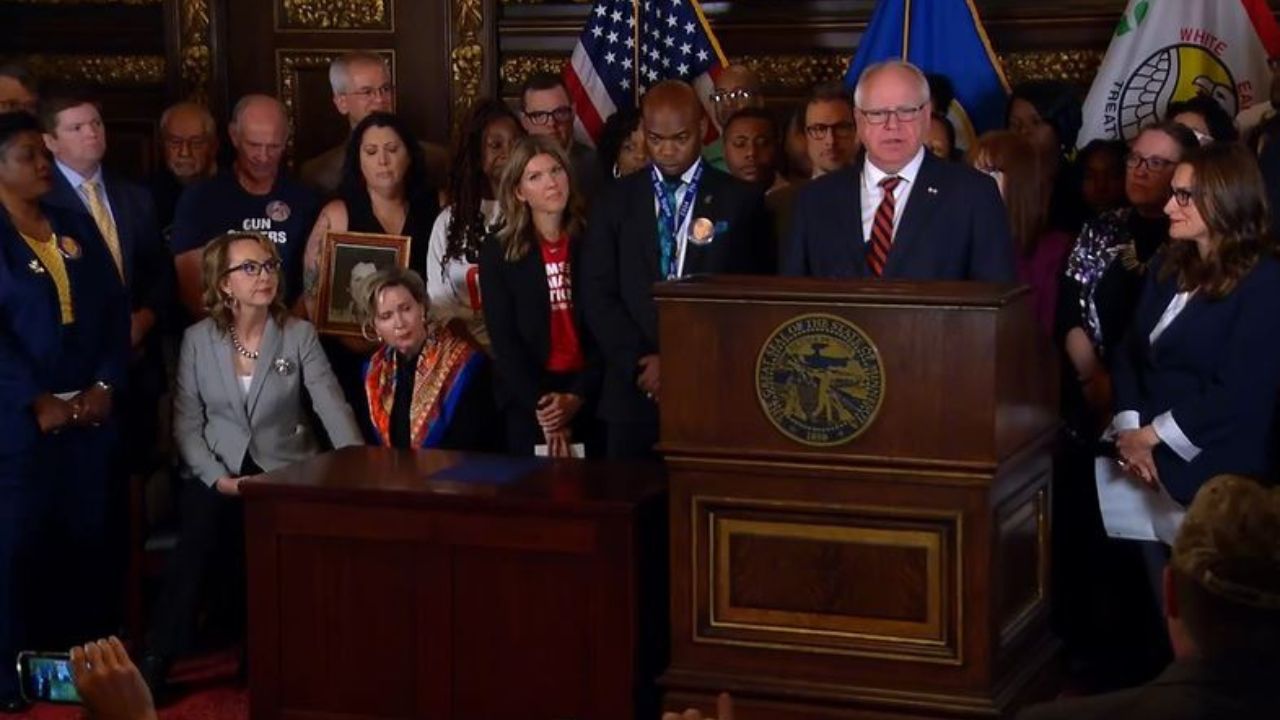Gov. Walz signed legislation on public, gun safety Friday

(ABC 6 News) – Governor Tim Walz signed historic gun safety measures into law Friday afternoon.
The gun safety measures are part of a public safety package that passed in the Minnesota House earlier this week by a vote of 69-63. It had passed the state senate last Friday by a vote of 34-33.
The $880 million legislation requires background checks for private gun sales, the addition of a red flag law that allows law enforcement to intervene when someone is at high risk of injuring themselves or others with a firearm and includes restrictions on when police in the state can use no-knock warrants.
Universal Background Checks
The bill requires a background check for private party transfers of pistols and semiautomatic weapons. A background check is not required for a private transfer of a hunting rifle or between immediate family members. Both parties must retain a copy of the record of the transfer for 10 years.
Extreme Risk Protection Orders
Extreme risk protection orders, also known as “red flag laws,” allows a family member, guardian, city or county attorney, or police chief to intervene when someone is at high risk of injuring themselves or others with a firearm.
Bureau of Criminal Apprehension
The bill invests over $43 million over four years for the Bureau of Criminal Apprehension (BCA) to combat violent crime statewide. This investment will provide increased funding for BCA lab analysis, analytics supports, and to continue partnerships with local law enforcement.
Limiting No-Knock Warrants
The bill limits the use of no-knock warrants. These warrants can only be allowed if either the search cannot be executed while the premises is unoccupied or the occupants in the premises present an imminent threat of death or great bodily harm to the officers executing the warrant or other persons.
Other highlights of the public safety bill include:
- Providing funding to reimburse counties for the costs of sexual assault examination kits, to fill the gap in federal victims of crime act funding, and for the BCA to meet a 90-day goal for forensic evidence exam turnaround times.
- The bill establishes the Office of Missing and Murdered Black Women and Girls to promote the safety and success of Black women and girls through training, advocating for systems change, and ending violence against and trafficking Black women and girls.
- Investing $87.2 million to help ensure evidence-based practices, bring community supervision systems up-to date with needed funding across the three delivery systems, and provide state funding to tribal governments.
- $70 million for the Office of Justice Programs (OJP) to provide grants to community-based crime prevention programs. Eligible grantees include organizations that support victims of gun violence, youth support, violence interrupters, homelessness support, neighborhood watch, re-entry programs for incarcerated individuals, and community and faith-based projects.
- Providing $5 million in fiscal year 24 for the new Intensive Peace Officer Education & Training Program. Local law enforcement agencies will be able to receive grants so they can pay education and training costs, in addition to paying the candidate a salary while they are in training.
- $35 million over two years in juvenile-justice efforts. This includes funding for youth-intervention grants, dual status youth programs, restorative justice grants, increasing the capacity of OJP’s Youth Services Office, establishing a new office at OJP for Restorative Justice, and funding an innovative pilot program in Ramsey County for juvenile home placement and treatment.
- Ensuring incarcerated individuals have access to free phone calls for family and friends.
- Increased funding to the Department of Human Rights to strengthen their investigative capacity, legal team, settlement monitoring team, and equity and inclusion in state contracting work. These investments will support the Department’s vision to make Minnesota a state where everyone can lead lives fully of dignity and joy.
Republicans argued it won’t protect Minnesotans, and they wanted more involvement in creating the bill.
Gov. Walz was joined by First Lady Gwen Walz, Lieutenant Governor Flanagan, former Congresswoman Gabrielle Giffords, Richfield Chief of Police Jay Henthorne, and gun violence survivor Melissa Kennedy for the signing.
Giffords, who was shot in the head at a public constituent event in 2011 where a gunman killed six people and injured 12, previously spoke on gun violence at the Capitol with Gov. Walz in March.
Following the signing, Giffords released a statement, saying, “Minnesotans know the toll gun violence takes on communities and families. In 2021, more than 500 Minnesotans died from gun violence—enough is enough. Governor Walz and lawmakers across the state have taken meaningful action to save lives from gun violence. With strong leadership, we can turn tragedy into action.”
“As a veteran, gun-owner, hunter, and dad, I know basic gun safety isn’t a threat to the Second Amendment – it’s about keeping our kids safe,” said Governor Walz. “There’s no place for weapons of war in our schools, churches, banks, or anywhere else people are just trying to live their lives. Today is about taking meaningful action to create a safer future for our kids, and I am proud to sign this commonsense, life-saving legislation into law.”
Watch the signing courtesy of Twin Cities ABC affiliate, KSTP-TV below.